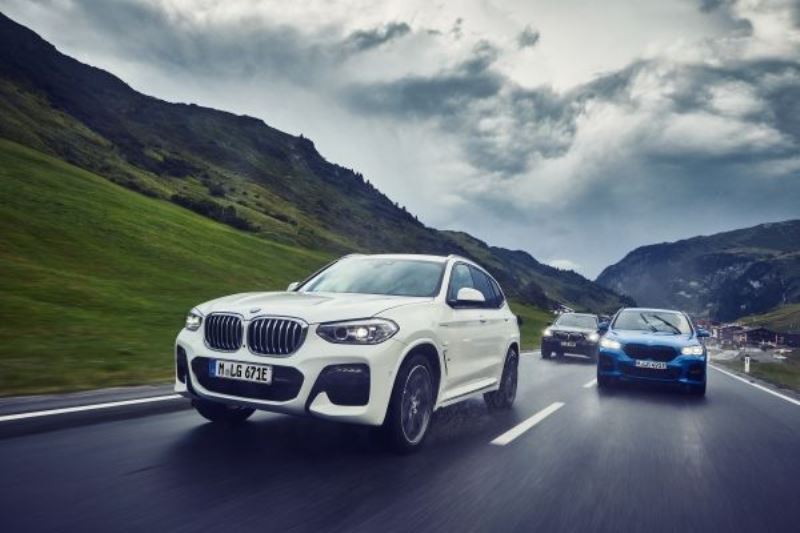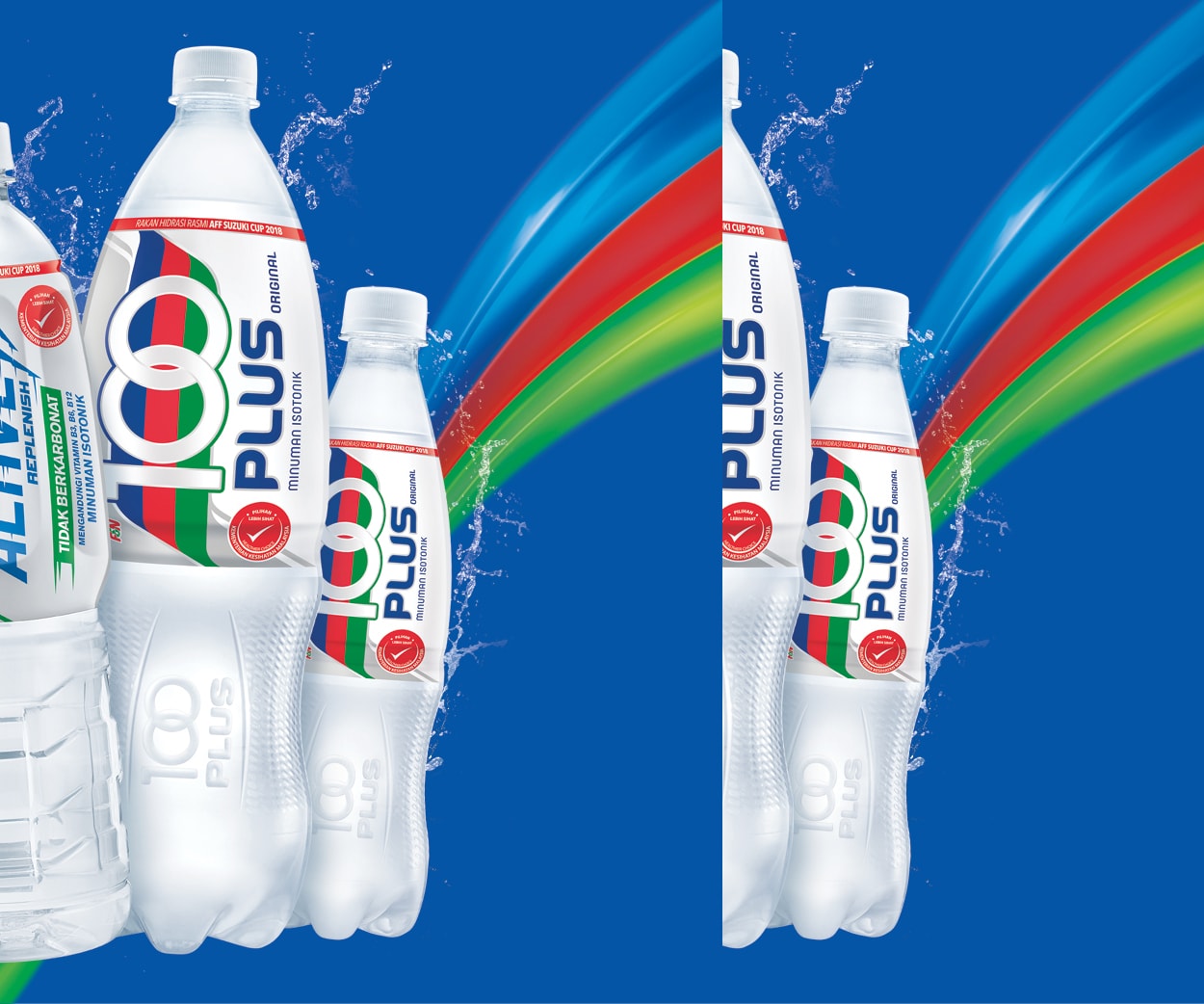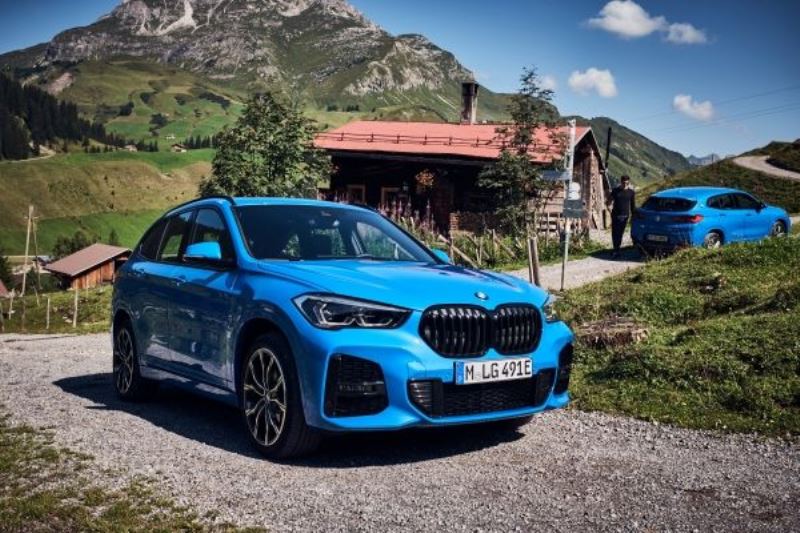 The BMW Group is consistently driving its electrification strategy forward and presents new plug-in hybrid models for an especially popular and dynamically growing vehicle category. In the new BMW X1 xDrive25e and the new BMW X2 xDrive25e, the intelligently controlled interaction between a fuel combustion engine and an electric motor as well as locally emissions-free travel can be experienced in the Sports Activity Vehicle (SAV) and Sports Activity Coupe (SAC) premium segment starting in 2020.
The BMW Group is consistently driving its electrification strategy forward and presents new plug-in hybrid models for an especially popular and dynamically growing vehicle category. In the new BMW X1 xDrive25e and the new BMW X2 xDrive25e, the intelligently controlled interaction between a fuel combustion engine and an electric motor as well as locally emissions-free travel can be experienced in the Sports Activity Vehicle (SAV) and Sports Activity Coupe (SAC) premium segment starting in 2020.
A highly efficient electric drive and a latest-generation lithium-ion battery enable an electrically powered range of up to 57 kilometres* in the two new plug-in hybrid models. With an average fuel consumption of 2.1 to 1.9 litres per 100 kilometres* and CO2 emissions between 48 and 43 grams per kilometre* for the BMW X1 xDrive25e and 2.1 to 1.9 litres per 100 kilometres* and between 47 and 43 grams per kilometre* for the BMW X2 xDrive25e, both models set a benchmark within their competitive fields. Combined power consumption of the BMW X1 xDrive25e is 14.3 to 13.8 kWh per 100 kilometres*, the corresponding values of the BMW X2 xDrive25e are 14.2 to 13.7 kWh per 100 kilometres*.
The hybrid specific all-wheel drive with its fast and precise distribution of power between the front and rear wheels delivers a high level of driving pleasure and thrilling agility.
The two plug-in models are an extension to the wide range of BMW models in the premium compact segment of SAV and SAC vehicles. In addition to numerous variants featuring extremely efficient petrol and diesel engines, models with electrified drive will be on offer for the first time.
Thus, the portfolio will include in addition to economical entry models with a 3-cylinder combustion engine also the new plug-in hybrid models and the BMW X2 M35i (combined fuel consumption: 7.1 – 6.8 l/100 km; combined CO2 emissions: 163 – 154 g/km*), the extremely athletic top model with a maximum output of 225 kW/306 hp. With the extension of its range in the premium compact segment the BMW Group’s model offensive is gaining further momentum in the area of plug-in hybrid models.
The current selection comprises the MINI Cooper SE Countryman (combined fuel consumption: 2.1 – 1.9 l/100 km; combined power consumption: 13.9 – 13.5 kWh/100 km; combined CO2 emissions: 47 – 43 g/km*), the BMW 225xe Active Tourer (combined fuel consumption: 1.9 l/100 km; combined power consumption: 13.5 kWh/100 km; combined CO2 emissions: 42 g/km*), BMW 3 Series and BMW 5 Series models and plug-in hybrid luxury sedans of the BMW 7 Series. In future, four BMW X models with plug-in hybrid drive will also be available.
As a pioneer in electric mobility BMW intends to have more than one million vehicles with electrified drive on the road by the end of 2021. By 2021, 25 percent of the vehicles sold by the BMW Group in Europe will feature an electric drive. By 2025 this figure is scheduled to reach 33 percent and 50 percent by 2030. The BMW Group plans to extend their portfolio by additional 25 electrified vehicles by 2023.
The plug-in hybrid system of the new BMW X1 xDrive 25e and the new BMW X2 xDrive25e consists of a 1.5 litre 3-cylinder petrol engine with BMW TwinPower Turbo Technology and an electric drive specially developed for this model. It is taken from the eDrive technology modular system of the BMW Group. The petrol engine mobilises a peak output of 92 kW/125 hp and a maximum torque of 220 Newton metres. It transfers its power to a 6-speed Steptronic transmission and drives the front wheels.
The electric motor generates an output of 70 kW/95 hp and delivers 165 Nm of torque to the rear wheels via a single-speed transmission. This makes for a hybrid specific all-wheel drive, which gives both models a unique level of agility in their competitive fields delivering hallmark SAV and SAC driving pleasure. The highly responsive power delivery of the electric motor, which delivers its full torque spontaneously from standstill, enables the driver to react extremely quickly to changing driving conditions.
In addition, the position of the electric motor above the rear axle contributes to the harmoniously balanced axle load distribution of the new BMW X1 xDrive25e and the new BMW X2 xDrive25e. In conjunction with the intelligently controlled interaction between the two power units, it provides maximum driving stability, ride comfort and dynamic response.
Together the combustion engine and electric motor produce a system output of 162 kW/220 hp. The maximum system torque of both drive units is 385 Nm. The new BMW X1 xDrive25e accelerates from 0 to 100 km/h in 6.9 seconds. The new BMW X2 xDrive25e does the 0 to 100 km/h sprint in 6.8 seconds.
In addition, the electric boost provided by the drive system ensures additional safety reserves and intense sporty flair when overtaking on country roads, for example. The top speed of the new BMW X1 xDrive25e is 193 km/h. Maximum speed of the new BMW X2 xDrive25e is 195 km/h.
With the very latest high-voltage battery cell technology, the new BMW X1 xDrive25e and the new BMW X2 xDrive25e possess generous reserves of electrical energy enabling the driver to conduct the main share of everyday travel locally emissions-free with the electric motor alone. The latest-generation lithium-ion battery has a gross energy content of 10 kWh. This allows for an electrically powered range of between 54 and 57 kilometres* in the BMW X1 xDrive25e (between 55 and 57 kilometres* in the new BMW X2 xDrive25e).
The high-voltage battery can be charged at conventional household sockets using the standard-equipment charging cable. An empty battery can be fully charged in around five hours in this way. It only takes 3.8 hours for the battery to reach 80 percent of its total capacity. Using a BMW i Wallbox, the relevant charging operation from 0 to 100 percent takes less than 3.2 hours. 80 percent of total capacity is already reached after 2.4 hours. The charging socket is located under a separate flap on the front left side wall of the car.
The driver can use the eDrive button on the centre console to influence the drive system’s operating mode. In the AUTO eDRIVE standard setting, the intelligent drive system ensures optimum interaction between the two power units in all driving situations. Navigation data is also used to manage the plug-in hybrid system to increase both efficiency as well as driving pleasure. When navigation guidance is activated, the anticipatory energy management can also take into account the route profile for controlling the drive system. The MAX eDrive mode can be activated for maximum use of the electric drive.
In this mode, the new BMW X1 xDrive25e and the new BMW X2 xDrive25e reach a top speed of 135 km/h. In addition there is also the SAVE BATTERY mode. It enables the driver to maintain the charging state of the high-voltage battery while driving or to increase it by means of recuperation. In this way battery capacity can be saved for later use when driving in purely electric mode in the city for example. The driving experience switch can be used independent of the drive mode.
In the new BMW X1 xDrive25e and the new BMW X2 xDrive25e, the driver can use this to activate the COMFORT, SPORT and ECO PRO modes in order to influence the drive and suspension functions as well as to operate the electrically powered comfort systems.
Due to a long electric range and low CO2 emissions, the new BMW X1 xDrive25e and the new BMW X2 xDrive25e (depending on equipment) meet the criteria which have been stipulated for the classification as an electric vehicle in Germany and the associated preferential treatment in public road traffic. In addition, it also qualifies for reduced company car taxation in Germany. Only half the gross list price is used as a basis when calculating the monetary benefit from private use of the company car.
The new BMW X1 xDrive25e and the new BMW X2 xDrive25e feature acoustic pedestrian protection as standard. When driving electrically at speeds of up to 30 km/h, an unmistakable sound designed specifically for electrified BMW models is generated to alert other road users to the approaching car without impairing the acoustic comfort of the vehicle occupants. In addition, the standard equipment of the two compact BMW X models with plug-in hybrid drive also includes 17-inch light alloy wheels, 2-zone automatic air conditioning as well as auxiliary air conditioning.
The interior can be pre-conditioned remotely via BMW Connected using a smartphone. The new BMW X1 xDrive25e is available as Advantage, Sport Line, xLine and M Sport models. For the new BMW X2 xDrive25e customers can choose from the following models: Advantage, Advantage Plus, M Sport and M Sport X. In addition to the respective equipment packages, virtually all options of the conventionally powered BMW X1 or BMW X2 are available for the plug-in hybrid models.
The positioning of the high-voltage battery underneath the rear seats not only leads to a very low centre of gravity, which optimises the agility of the BMW X1 xDrive25 and the new BMW X2 xDrive25e, but also to a slightly reduced transport capacity compared to the conventionally powered compact model variants.
The luggage compartment volume is fully available in primary use. In the new BMW X1 xDrive25e luggage compartment capacity is 450 litres. With a standard split of 40: 20: 40, the folding backrests enable this to be increased to 1,470 litres. A trailer tow hitch with detachable ballhead is optionally available for the new BMW X1 xDrive25e. The maximum trailer load is 750 kilograms.
































